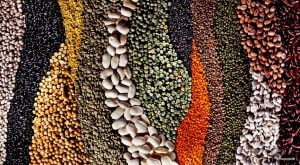Nothing beats a good piece of chocolate. It’s rich, smooth, creamy and makes us feel good, until the guilt sets in. Chocolate’s mood-enhancing qualities are an obvious reason why it is so strongly associated with Valentine’s Day, as a gift for lovers and loved ones.
Chocolate’s Dark Secret
There’s no getting around the fact that chocolate is a high fat food. But there is growing evidence that, in small quantities, some kinds of chocolate may actually be good for you. Dark chocolate is naturally rich in flavonoids (or more specifically, flavanols, a sub-class of these antioxidants). These compounds are thought to lower blood pressure and help protect against heart disease—among other things. Recent studies conducted both in the U.S. and Europe seem to support chocolate’s beneficial effects on the cardiovascular system, encouraging chocolate manufacturers, such as Mars, to develop proprietary methods of processing cocoa beans aimed specifically at preserving flavonoid content. Traditional roasting and fermentation methods are thought to destroy up to three-quarters of these compounds. Mars uses its Cocoapro trademark on some of its products, indicating the use of this method, and Swiss premium chocolate company Barry Callebaut uses Acticoa.
What about the Fat?
It’s still hard to think of chocolate as a health food. Part of the allure is the guilty pleasure of eating it. But before we raid the candy store, it’s worth remembering that chocolate is not a low calorie food. A serving size of Dove dark chocolate (40 grams) contains 210 calories and 13 grams of fat, 8 of which are saturated, although some of this saturated fat is in the form of stearic acid, which is converted by the liver into a “healthier” monounsaturated fat.
Cocoa Powder
Cocoa powder, which is low fat, would surely be a healthier way to get both our chocolate fix and our dose of flavanols. Alkalizing cocoa (or Dutch processing) produces a milder flavor and darker color but destroys most of the flavonoids. Since flavanol-rich cocoa is naturally bitter, Mars has worked hard to make it palatable. First, it sold a flavanol-rich series of snack bars and small chocolate bars. These bars were shown in one small study to actively lower total and LDL (bad) cholesterol in those with elevated cholesterol levels, bolstering Mars’ claim that its flavanol-rich snack bars were heart healthy. More recently, Mars Botanicals launched a cocoa-extract supplement that can be added to drinks and cereals, and Barry Callebaut offers a high-flavanol cocoa powder, which gives chocoholics a healthier, low-fat alternative to high-fat chocolate bars.
Still, when the urge to eat chocolate strikes, it’s fine to allow ourselves an occasional ounce of flavanol-rich dark chocolate. It’ll make us feel good, and it may even do some good.
Chocolate and nutrition:
Chocolate, in moderate amounts, can actually be good for you! This is great news for people who love sweets but are trying to eat healthy. Here’s the scoop:
- Stearic acid is the main saturated fat found in cocoa butter. It doesn’t raise blood cholesterol levels. It may also decrease platelet activity, contributing to heart health in a similar way that baby aspirin decreases that activity.
- Eating a small amount of chocolate will probably prevent a chocolate binge. So when you feel a craving, have a piece!
- Chemicals in chocolate called tannins actually prevent cavities from forming.
- A chocolate bar has around 3-4 grams of protein.
- Chocolate contains antioxidants called flavanoids, a category of polyphenols, which may prevent cell damage and reduce the risk of cancer and other age-related chronic diseases. One study found that the polyphenol content in chocolate is four times that found in tea. The monounsaturated fat in chocolate, oleic acid, is also found in olive oil. It can lower LDL and total cholesterol levels in the blood.
- Chocolate is a plant-based food, and contains many nutrients found in other plant foods.
- High flavanol cocoa in beverage form may help blood flow in those who are diabetic by increasing normal endothelial function in the blood vessels.
- A 1.55 ounce milk chocolate bar contains 9 grams of caffeine, compared to around 40 in a regular soft drink.
- Believe it or not, there is no scientific evidence linking sugar consumption to hyperactivity in children. As a matter of fact, sugar consumption has a calming effect because it increases the level of serotonin in the brain. (Source: Food and Drug Administration’s “An Evaluation of Health Aspects of Sugars Contained in Carbohydrate Sweeteners” (1986))
- Chocolate is a good source of essential minerals copper, magnesium and calcium.
- source:







